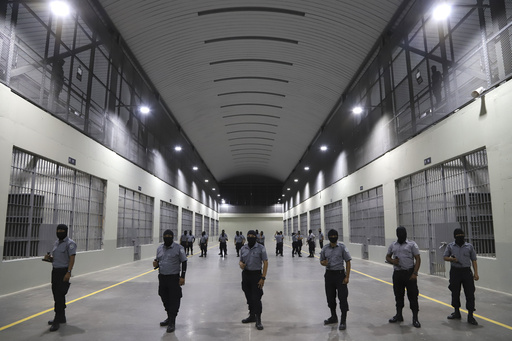GUATEMALA CITY — President Donald Trump announced on Tuesday that he is considering the possibility of transferring American inmates involved in serious crimes to prisons in other countries. This discussion follows an offer from El Salvador to accept both American criminals and undocumented migrants facing deportation from the U.S. Trump expressed that if it were legally feasible, he would take action immediately, noting that the administration is currently evaluating the legal framework surrounding this idea.
On a related note, Secretary of State Marco Rubio characterized El Salvador’s proposition as “very generous.” He acknowledged that accepting violent American criminals does raise significant legal concerns but indicated that Trump would ultimately decide whether to proceed. Rubio’s agreement with Salvadoran President Nayib Bukele entails that El Salvador would take in U.S. deportees of any nationality, including American citizens and legal residents convicted of severe crimes.
Rubio emphasized at a news conference in Costa Rica alongside President Rodrigo Chaves that he appreciates the offer, remarking that such an arrangement is unprecedented. He highlighted how it could help manage some of the most dangerous offenders in the U.S. at a reduced cost. However, he indicated that the administration will need to deliberate on this matter thoroughly.
During his visit across Central America, Rubio also addressed immigration issues, a priority for the Trump administration, while he managed significant changes within the U.S. Agency for International Development (USAID). This agency has been facing turmoil since substantial staff cuts were implemented following Trump’s decision to freeze foreign assistance after taking office. The decision to close USAID, as suggested by Elon Musk, has created uncertainty about aid delivery mechanisms, raising concerns among employees and members of Congress.
Rubio remarked on the troubling situation within USAID, mentioning that many employees are apprehensive about their future job security. He stated that any organization relying on U.S. funding should be able to navigate responses to such freezes effectively, casting doubt on those that cannot.
In talks with Costa Rica’s President Chaves, the conversation also turned to the challenges posed by migration and security, particularly with Costa Rica becoming a key transit nation for migrants heading toward the U.S. and a destination for many fleeing deteriorating conditions in Nicaragua. Chaves expressed a need for stronger efforts against organized crime and drugs and noted Rubio’s commitment to maintain U.S. support to address these issues.
Following his meetings in Costa Rica, Rubio arrived in Guatemala City to consult with Guatemalan President Bernardo Arévalo. In a previous encounter with President Bukele in San Salvador, Bukele confirmed his government’s readiness to accept U.S. prisoners. He clarified that El Salvador would only take “convicted criminals,” and this arrangement would involve a cost that would be manageable for the U.S. while ensuring the sustainability of the Salvadoran prison system.
Conditions in El Salvador’s overcrowded prisons are described as dire by the State Department, with many facilities lacking basic sanitation and other needs. The country has been under a state of emergency since March 2022 due to escalating gang violence, resulting in widespread arrests and suspension of certain legal rights. Bukele has implemented strict measures in prisons, limiting visits and imposing reduced meal times while constructing a new prison designed to hold large numbers of gang members.
Despite past reputations for violence, El Salvador recently recorded a significant drop in homicides, which has bolstered Bukele’s popularity amid the country’s 6 million residents. Meanwhile, immigration discussions have continued to be a focal point of Rubio’s diplomatic trip through Central America, including countries such as Panama and the Dominican Republic. He has assumed a role concerning USAID but has delegated daily operations to ensure a focus on immigration matters.
In correspondence leaked to the press, Rubio outlined ongoing efforts to reorganize USAID and adjust its focus on foreign relations, suggesting a potential merger of certain operations within the State Department. He noted the current disarray resulting from the freeze on foreign assistance, implying a fundamental need to streamline and enhance the effectiveness of U.S. foreign aid initiatives.
